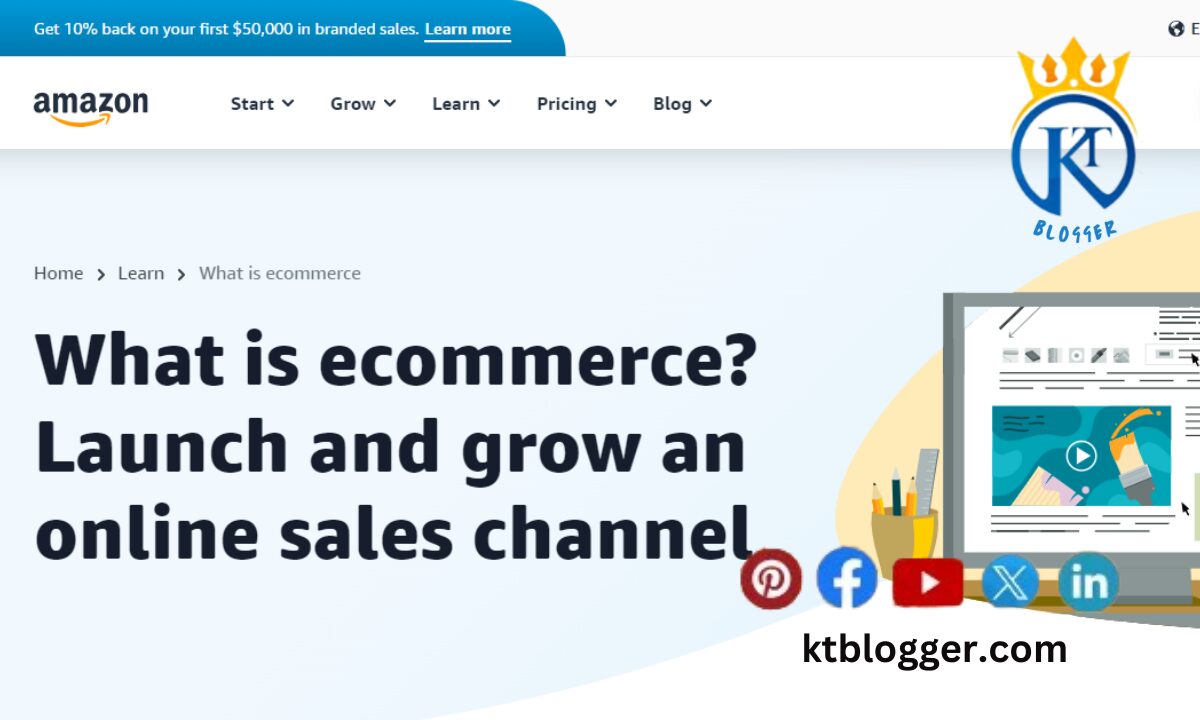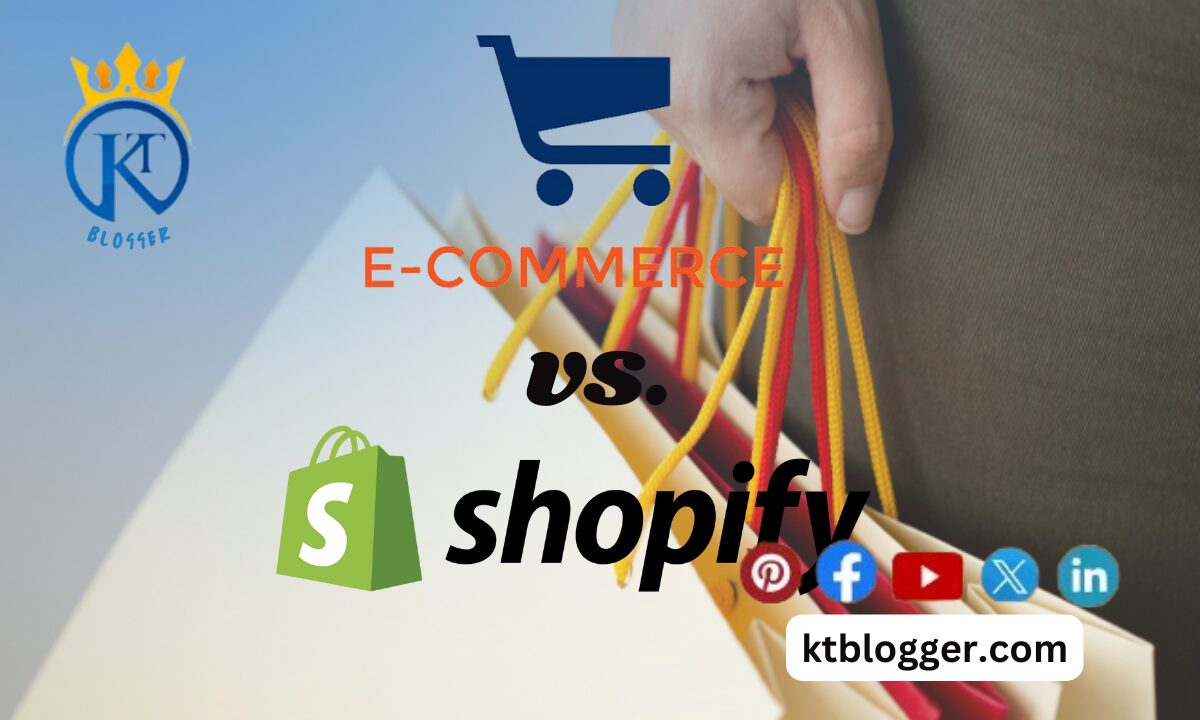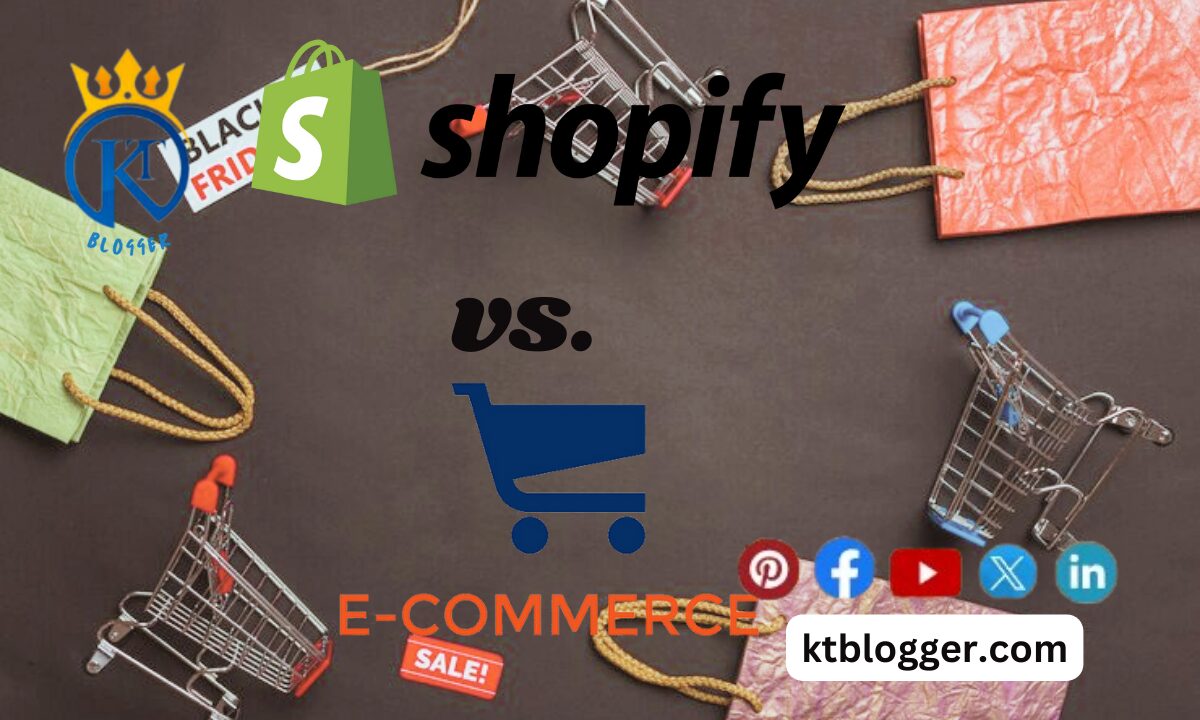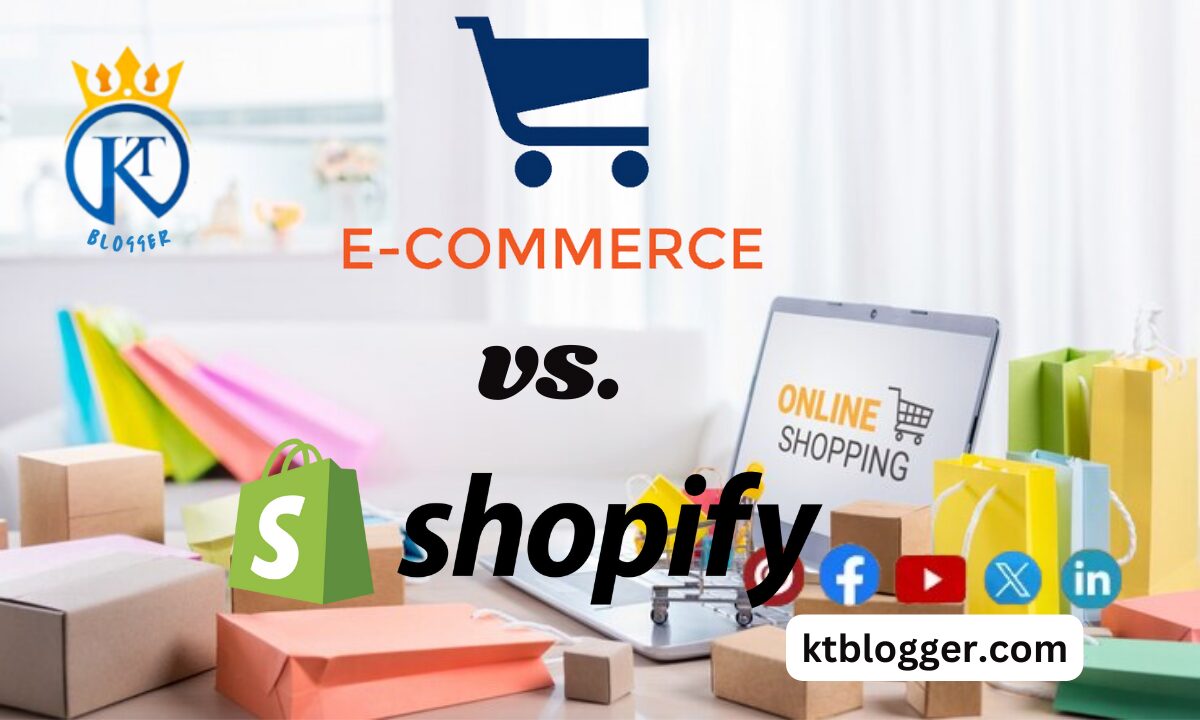If you haven’t started selling stuff online yet, now’s a good time to think about it. The COVID-19 pandemic messed up a lot of things, but it also made online shopping really popular. In the U.S. and Canada, there’s been a huge increase in online orders.
However many people are still unsure about the difference between ecommerce and Shopify. Yes, they’re still wondering “Is ecommerce and Shopify store same?”
Also, there’s a big debate about whether it’s better to use Shopify or create your own ecommerce website. So, it’s important to think carefully before you make a decision.
No, eCommerce and Shopify stores aren’t exactly the same. While eCommerce refers to buying and selling online, Shopify is a platform for creating online stores. Shopify simplifies setting up a store with features tailored for eCommerce. It offers advantages like easy customization and managing orders.
However, other eCommerce platforms exist too, each with unique features and pricing. Ultimately, the choice depends on your business needs and goals.
In this article, I’m going to explore is ecommerce and Shopify store same or different. Plus, I’ll help you figure out which option is best for you when you’re running your store online.
Content
Ecommerce
First, let’s talk about ecommerce. Ecommerce stands for electronic commerce, which basically means buying and selling stuff on the internet. It covers various activities that allow businesses and consumers to connect online:

- Online Stores: These are digital storefronts, like online versions of brick-and-mortar shops. Customers can browse and buy from the comfort of their homes. These can be custom-built websites or platforms like Shopify that provide a ready-made framework.
- Marketplaces: These are giant online hubs like Amazon and eBay that connect buyers and sellers across a vast array of products. Marketplaces offer businesses huge reach and visibility while giving consumers a broad selection of goods.
- Social Commerce: This is the latest trend, where people buy and sell directly through social media platforms like Instagram and Facebook. This leverages the popularity of social media to make buying and selling seamless.
- Mobile Commerce (M-commerce): With the rise of smartphones and tablets, mobile shopping is booming. Consumers use their devices to browse, research, and buy, so businesses need to ensure their e-commerce experiences are optimized for mobile.
E-commerce offers advantages for both businesses and consumers. Businesses gain wider reach, can analyze customer behavior, and potentially reduce costs. Consumers enjoy convenience, selection, and often competitive prices.
Shopify
Now, let’s talk about Shopify. Shopify is a popular platform for making online stores. It offers a comprehensive toolkit with features designed to simplify online store creation and operation.

- Easy Store Setup: Shopify is known for its user-friendly interface, making it easy to set up a store even without technical expertise. It provides templates and tools to create attractive and functional storefronts.
- Product Management: Adding, editing, and organizing products is essential. Shopify offers robust tools for managing product listings within your store. From uploading images and descriptions to setting prices and inventory levels, Shopify simplifies product management.
- Payment Processing: Secure and smooth transactions are crucial. Shopify supports various payment methods like credit cards, digital wallets, and more. Its built-in system simplifies payment setup and management, improving the checkout experience.
- Marketing Tools: In e-commerce, effective marketing is vital. Shopify offers a suite of marketing tools to help businesses attract and retain customers. This includes email marketing, social media integration, SEO tools, and promotional discounts.
- Business Growth: As businesses expand, Shopify offers scalability and flexibility. With tiered plans offering varying features and support, businesses can upgrade as they grow. Additionally, Shopify’s app store allows businesses to extend the platform’s capabilities to fit their specific needs.
Is Ecommerce and Shopify Store Same? Shopify vs. Ecommerce
E-commerce and Shopify stores share similarities, but they’re not identical. E-commerce encompasses all online buying and selling activities, while Shopify is a platform for building your online store.

Shopify simplifies the process with its user-friendly interface, making it a popular choice for e-commerce businesses.
However, consider other platforms too, like Wix or BigCommerce, to find what best suits your needs.
Both ecommerce and Shopify stores allow you to sell online, but they’re not the same thing. Knowing the difference is key for businesses entering the digital commerce world.
1. Scope: Shopify vs. Ecommerce
E-commerce offers a wider range of options. You can build your own unique online store, sell on existing marketplaces like Amazon or eBay, or even leverage social media platforms to make sales.
A Shopify store is a specific tool within that toolbox. It’s a platform that lets you easily create and run your own online store. It’s like having a pre-made store kit with everything you need to get started quickly.
2. Customization: Shopify vs. Ecommerce
Ecommerce offers more freedom. You can build a custom online store exactly how you want it. But this requires tech skills and can be expensive. It’s like building your own store from scratch, which is great if you have the tools and know-how.
Shopify stores are easier to use. They have pre-designed templates and tools that make setting up your store a breeze. You don’t need coding knowledge. However, you have less control over the look and feel compared to a custom store. It’s like using a pre-fab store building – faster but with limited design options.
3. Cost: Shopify vs. Ecommerce
Custom ecommerce stores require upfront investment. You’ll pay for website development, design, and ongoing maintenance. It’s like buying all the tools for your store at once. This can be cost-effective in the long run if you have the resources, but it’s a big initial hurdle for startups.
Shopify stores use a subscription model. You pay a monthly fee based on the features you need. It’s like renting the store tools – lower upfront cost, but you keep paying as you use it. This is easier on the wallet for new businesses, but the fees can add up over time.
4. Maintenance: Shopify vs. Ecommerce
With a custom store, you’re responsible for everything – software updates, security patches, and keeping the website running smoothly. It’s like taking care of your own store building – requires time and technical knowledge.
Shopify handles most of the maintenance for you. They automatically update software, monitor security, and take care of the servers. It’s like having a landlord who takes care of building upkeep – frees you up to focus on running your business.
Which is Better? Shopify vs. Ecommerce
If you’re new to selling things online and want to get started quickly, Shopify is a good option. It’s easy to use and can help you set up your store fast.

But if you’re ambitious and want your store to be unique, making your ecommerce website might be the way to go. With a custom-built site, you have more freedom to make it exactly how you want.
It’s important to think about what you need for your business. Shopify is great for beginners, but a custom website might be better for long-term growth.
The choice between Shopify and your own website depends on your goals and preferences. Take your time to consider what’s best for you.
If you’re unsure, you can try Shopify’s free trial to see how it works and decide if it’s right for you.
Which is Better: ecommerce or Shopify?
Ecommerce is actually a broader concept than Shopify. It refers to selling goods or services online, while Shopify is a platform that helps you build an online store. Ecommerce encompasses various methods of selling online, including using platforms like Shopify, but also other methods like selling on Amazon or eBay.
What are the different types of ecommerce?
There are three main types of ecommerce:
1. Business-to-Consumer (B2C):
This is when businesses sell directly to consumers online. For example, buying clothes from an online retailer like ASOS or electronics from Amazon.
2. Business-to-Business (B2B):
This type involves businesses selling products or services to other businesses. For instance, when a manufacturer sells parts to another company for production.
3. Consumer-to-Consumer (C2C):
This occurs when consumers sell products or services to other consumers. Websites like eBay and Craigslist facilitate these types of transactions.
Can you give an example of e-commerce?
An example of e-commerce is when a small business uses Shopify to set up an online store. They can showcase their products, take orders, and process payments through their Shopify website. It’s a convenient way for businesses to reach customers and sell their products without needing a physical storefront.
Summing Up
Is ecommerce and shopify store same? Well, they’re similar but not exactly alike. They offer different experiences for both shoppers and business owners. Deciding which one is best for your products or services depends on things like how much money you have to start, what kind of business you’re running, and how big you want it to be.





